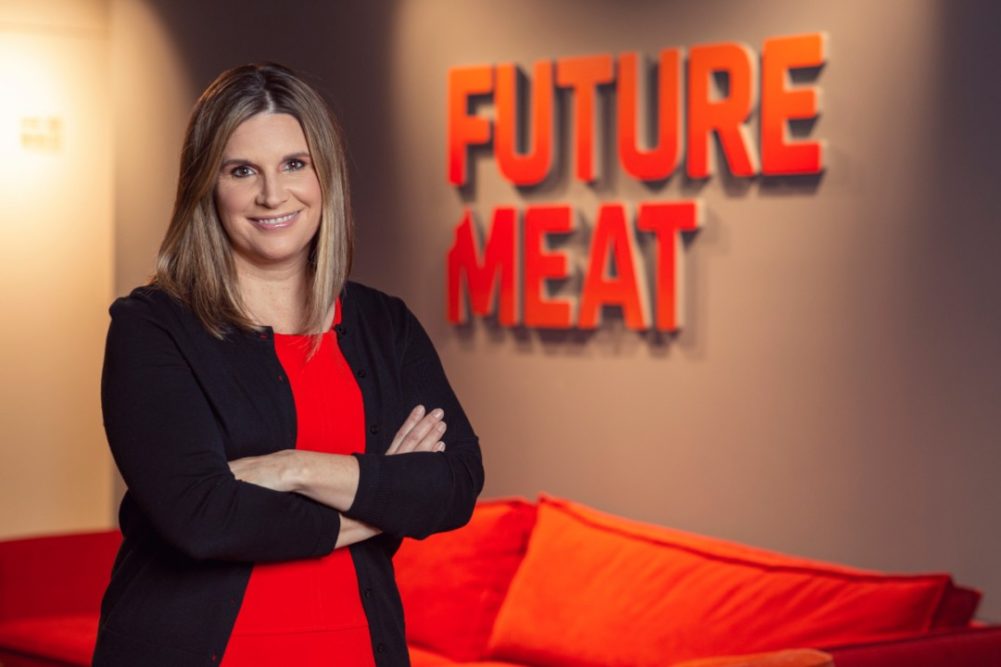KANSAS CITY, MO. – Over the past 25-plus years, Nicole Johnson-Hoffman’s career has exposed her to many different aspects of the food industry, from the courtroom to the boardroom to the slaughter room floor. It even landed her on the stage of “The Oprah Winfrey Show.” But, as of this past February, the longtime leader of multiple meat companies and high-profile champion of the beef industry has assumed the chief executive officer role with a promising alternative meat company, Rehovot, Israel-based Future Meat Technologies.
Future Meat’s proprietary technology creates cultivated meat directly from animal cells without the need to slaughter animals. Its technology is based on the rapid natural proliferation of connective tissue cells growing in stainless steel fermenters that continuously remove waste products to maintain a constant physiological environment. Unlike many other cultured meat startups, Future Meat’s connective tissue method is more cost-efficient than using stem cells, according to Yaakov Nahmias, founder and president.
Johnson-Hoffman’s unconventional career path has taken her all over the world. Her position with Future Meat has her working at the company’s office and pilot plant in Tel Aviv, Israel, seemingly a world away from the small farm she grew up on in Minnesota.
Minnesota roots
After graduating from college, Johnson-Hoffman went on to complete law school in 1998. But beyond that, she didn’t have a concrete plan of what would come next.
“I didn’t have a really clear vision for what I would do after law school,” she said.
Fortunately, she was recruited by Cargill to join its in-house law department while still attending law school and began her career there after graduating.
She went on to work in the company’s financial services business before transitioning to operations in 2008, working as the general manager at Cargill’s Fort Morgan, Colo., beef plant, a progression that likely surprised many of her industry contemporaries.
Making the transition from a corporate role to working in the trenches at a high-volume beef plant was not a traditional career progression.
“It was thrilling,” she added. “I loved working in the factory in Colorado, the opportunity to run a beef plant is something that I still can’t believe Cargill granted me.”
After leaving Cargill in 2016, Johnson-Hoffman went to work for OSI, where she was based in Aurora, Ill., and oversaw the company’s business segment that supplied beef to McDonald’s Corp. She ended her five-plus-year tenure with OSI working for a year in Gersthofen, Bavaria, Germany, managing its processed foods business. During her time at OSI her oversight of production included traditional proteins as well as working in partnership with alternative protein companies to make vegetable-based products.
Participating in the production of plant-based alternative proteins at OSI gave Johnson-Hoffman a glimpse of how innovation in the food industry can take many forms and how there is potential for even more innovation in plant-based foods and other meat alternatives.
“Like everyone, I have watched the rise in interest of these new alternative protein products, and I’ve tried them myself,” she said. “Some of them I loved, some of them I didn’t love.”
Johnson-Hoffman has also stayed abreast of the development of cultured meat products over the years.
“I watched the rise of cultured meats with a whole lot of skepticism,” she said.
Challenges facing what she prefers to call “cultivated” meat are many, including scalability and acceptance in the market, but that hasn’t deterred her.
“There are a lot of people out there who are happy to say, ‘it can never be done,’” she said. “But one of the benefits of being 50 years old now is that I’ve heard that over and over again in my life. I’ve watched how the things that could never be done have miraculously been done by the people who were willing to put in the hard work to make it possible.”
To read the entire report, see MEAT+POULTRY’s “Meat alternative trends+technology,” a supplement to the May issue.


